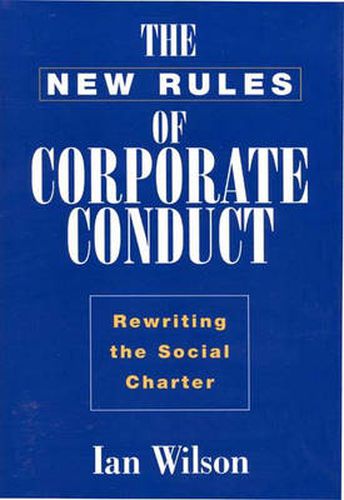Readings Newsletter
Become a Readings Member to make your shopping experience even easier.
Sign in or sign up for free!
You’re not far away from qualifying for FREE standard shipping within Australia
You’ve qualified for FREE standard shipping within Australia
The cart is loading…






Corporations operate under the terms of a largely unwritten, constantly changing social charter-a dictum as forceful as their written legal charter. Wilson explores the rules that are beginning to govern corporate performance, rules that arise from society’s ever changing values and expectations. Provoking these changes are four formative forces: the power shift from the public to private sector; globalization; economic restructuring; and, the transforming technologies of the computer and communications revolution. The rules emerging from them will dictate higher standards and changed behavior in seven crucial areas of corporate conduct. Wilson argues that corporate social responsibility is no longer a peripheral public relations activity. Rather, it is an integral part of corporate strategy. Trends may seem to be running in corporations’ favor, but the same trends also place greater responsibility and higher public expectations on corporations. The next decade, says Wilson, is likely to be a critical testing time for democracy, market systems, and by extension the private corporation. His book is a detailed analysis of the seven new rules and what their impact will be on U.S. and ultimately world corporations. Wilson concludes his book with a detailed agenda of needed, and workable, corporate responses to the new rules and cites the initiatives that many corporations are already taking to live by them.
The seven new rules of conduct that corporations will have to observe, sooner rather than later. (1) Legitimacy: to earn and retain social legitimacy the corporation must define its mission in terms of social purpose, rather than the maximization of profit. (2) Governance: the corporation must be thought of, managed, and governed as a community of stakeholders, not as the property of investors. (3) Equity: corporations must strive to achieve greater perceived fairness in the distribution of economic wealth and the treatment of stakeholder interest. (4) Environment: corporations will have to integrate the practice of restorative economics and sustainable development into the mainstream of their business strategy (5). Employment: they must rewrite the employment contract, addressing the values of the new work force. (6) Public-Private Sector Relationships: corporations must work with governments to achieve a viable and publicly accepted redefinition of their societal roles and responsibilities. (7) Ethical Conduct: corporations will have to elevate and monitor the level of ethical performance to earn the trust which is the foundation of sound relations with stakeholder groups. Is all this impossible? Not at all says Wilson, and he documents how many of America’s most successful companies are operating in whole or in part by these rules already, and how others have begun doing so with immediate positive results.
$9.00 standard shipping within Australia
FREE standard shipping within Australia for orders over $100.00
Express & International shipping calculated at checkout
Corporations operate under the terms of a largely unwritten, constantly changing social charter-a dictum as forceful as their written legal charter. Wilson explores the rules that are beginning to govern corporate performance, rules that arise from society’s ever changing values and expectations. Provoking these changes are four formative forces: the power shift from the public to private sector; globalization; economic restructuring; and, the transforming technologies of the computer and communications revolution. The rules emerging from them will dictate higher standards and changed behavior in seven crucial areas of corporate conduct. Wilson argues that corporate social responsibility is no longer a peripheral public relations activity. Rather, it is an integral part of corporate strategy. Trends may seem to be running in corporations’ favor, but the same trends also place greater responsibility and higher public expectations on corporations. The next decade, says Wilson, is likely to be a critical testing time for democracy, market systems, and by extension the private corporation. His book is a detailed analysis of the seven new rules and what their impact will be on U.S. and ultimately world corporations. Wilson concludes his book with a detailed agenda of needed, and workable, corporate responses to the new rules and cites the initiatives that many corporations are already taking to live by them.
The seven new rules of conduct that corporations will have to observe, sooner rather than later. (1) Legitimacy: to earn and retain social legitimacy the corporation must define its mission in terms of social purpose, rather than the maximization of profit. (2) Governance: the corporation must be thought of, managed, and governed as a community of stakeholders, not as the property of investors. (3) Equity: corporations must strive to achieve greater perceived fairness in the distribution of economic wealth and the treatment of stakeholder interest. (4) Environment: corporations will have to integrate the practice of restorative economics and sustainable development into the mainstream of their business strategy (5). Employment: they must rewrite the employment contract, addressing the values of the new work force. (6) Public-Private Sector Relationships: corporations must work with governments to achieve a viable and publicly accepted redefinition of their societal roles and responsibilities. (7) Ethical Conduct: corporations will have to elevate and monitor the level of ethical performance to earn the trust which is the foundation of sound relations with stakeholder groups. Is all this impossible? Not at all says Wilson, and he documents how many of America’s most successful companies are operating in whole or in part by these rules already, and how others have begun doing so with immediate positive results.